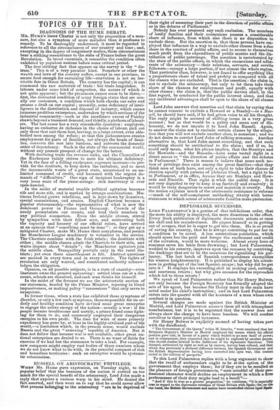RUSSELL ON ARISTOCRATIC PRIVILEGE.
Wzritir Mr. Hume gave expression, on Tuesday night, to the popular belief that the business of the nation is carried on too much for the special benefit of the aristocracy, Lord John made a reply that exposes a curious warp in his mind. He denied the fact asserted, and then went on to say that he could never allow that persona belonsing to the aristocracy "are to be deprived of
their right of assuming their part in the direction of public affairs or in the debates of Parliament."
Nobody has ever proposed any such exclusion. The members of lordly families and their connexions possess a considerable share of influence, from which also there is no disposition to exclude them. But the assertion is, that those persons have em- ployed that influence in a way to exclude other classes from a due share in the conduct of public affairs, and to secure to themselves much profit from the expenditure of public monies and the dis- tribution of public patronage. The assertion is corroborated by the state of the public offices, in which the connexions and adhe- rents of the aristocracy — their relations, servants, and servile followers—occupy a large portion, if not almost the whole region-. That particular class, however, is not found to offer anything like a proportionate share of talent and probity as compared with all the classes who are excluded. That is the assertion : the claim is, not to exclude the aristocracy, but only to let them take their share of the chances for employment and profit, equally with other classes : the claim is, that the public service shall, in the first regard, be conducted for the public interest alone, and that any incidental advantages shall be open to the share of all chases alike.
Lord John answers that assertion and that claim by saying that he cannot consent to exclude a Howard or a Stanley—or a Rus- sell, he should have said, if he had given voice to all his thought. The reply might be accused of shifting terms in a very gross manner; but as that would be a paltry and mean sort of dis- honesty, we do not impute it to Lord John Russell. Again, to answer the claim not to exclude certain classes by the allega- tion that you will not exclude another class, is nonsense ; and we do not desire to convict Lord John of talking nonsense. Another alternative is, that Lord John meant something, and that such something should be antithetical to the claim; and if so, he could only mean, what his phrase implies, that the Stanleys and the Howards—and the Russells—have some vested right in a direct access to "the direction of public affairs and the debates in Parliament." There is reason to believe that some such no- tion of privilege does exist among the great families—that they think men of birth have, not only a right to take their chance of election equally with persons of plebeian blood, but a right to be in Parliament, or in office, because they are Stanleys and How- ards and Russells. That right is what the public deny. It is not very dignified to try to keep it up furtively and evasively ; it would be truly dangerous to assert and maintain it overtly. But the notion explains much of the aristocratic resistance to reforms —much of the self-complacent unblushing rivalry with better statesmen to which scions of aristocratic families make pretension.


























 Previous page
Previous page